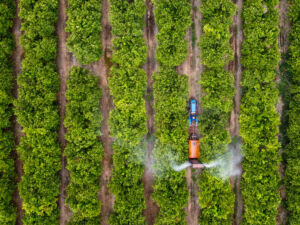Plastics of the Future? Interdisciplinary Review on Biobased and Biodegradable Polymers: Progress in Chemistry, Societal Views, and Environmental Implications
Sara T. R. Velasquez et al.
Available online
The junior research group PlastX, led by ISOE, is examining the societal role of plastic and the associated environmental impacts. Within this framework, the team of social and natural scientists is attempting to find out how plastic might be used more sustainably.
The group of junior researchers is taking an interdisciplinary and transdisciplinary research approach and is viewing the issue from a socio-ecological risk perspective. This complex environmental problem is characterised by the interconnected risks associated with the material plastic through its manufacturing, use and disposal. Many actors in various constellations are involved in this, who can both cause risks as well as be impacted by them. In addition, there is uncertainty about the direct and indirect impact of plastics on health and the environment. Because of these characteristics, the subject is conceptually conceived of as a systemic risk.
The overall objective of the project is
The problem will be analysed in the following areas:
Plastic is an ambivalent material: On the one hand, because of its versatile properties and wide range of applications, plastic has revolutionized countless areas of everyday life within the last decades. On the other hand, the manufacturing, use and disposal of plastic is linked to global environmental problems and risks which impact various systems. In particular, the accumulation of plastic waste in the natural environment is a serious encroachment upon various ecosystems which, due to the extended decomposition time of most plastics, will bear witness to human dominance during this era for hundreds of years.
The term “plastic” covers a wide range of various different synthetic polymers, which are manufactured on a global scale of about 311 million tonnes per annum. The majority of plastics produced is needed for packaging applications. On the disposal side, plastics are either recycled, incinerated, or dumped in landfills in many countries. Every year, about 4.8 to 12.7 million tonnes of plastic waste reach the seas and oceans via rivers because they have not been disposed of properly. When plastic waste decomposes, smaller fragments of plastic (microplastics) are created which accumulate in the environment; in addition, microplastic particles can enter the environment directly due to their use, e.g. in cosmetic products. It has been shown that plastic particles are ingested by various aquatic organisms. There is major uncertainty about potential damage to the ecosystem which could also impact human health and the food chain. Plastic-associated chemicals (additives such as plasticisers, but also adsorbed pollutants), which can have damaging effects on the health of humans and animals, are also under scrutiny.
Partners of the junior research group come from the fields of environmental consultancy, development cooperation, food retailing, nature conservation, consumer protection, as well as water and waste management.
The junior research group „PlastX – Plastics as a systemic risk for social-ecological supply systems“ is funded by the German Federal Ministry for Education and Research (BMBF) as part of the programme „Research for sustainable development (FONA)“. In FONA, PlastX belongs to the funding priority „SÖF – Social-ecological research“ within the funding area „Junior research groups in social-ecological research“.
Sozial-ökologische Forschung zu Plastik in der Umwelt. Ergebnisse der Forschungsgruppe PlastX
Johanna Kramm, Carolin Völker, Tobias Haider, Heide Kerber, Lukas Sattlegger, Lisa Zimmermann (2020). ISOE – Institut für sozial-ökologische Forschung. Frankfurt am Main
Sara T. R. Velasquez et al.
Available online
Johanna Kramm
Available online
Johanna Kramm, Carolin Völker
Available online
Heide Kerber
Available online
Lukas Sattlegger
Available online
Sozial-ökologische Forschung zu Plastik in der Umwelt. Ergebnisse der Forschungsgruppe PlastX
Johanna Kramm, Carolin Völker, Tobias Haider, Heide Kerber, Lukas Sattlegger, Lisa Zimmermann (2020). ISOE – Institut für sozial-ökologische Forschung. Frankfurt am Main
How do chemicals affect health, ecosystems and the economy? How can we create a better understanding and greater awareness of pollutant risks?
Go to Topic Page

